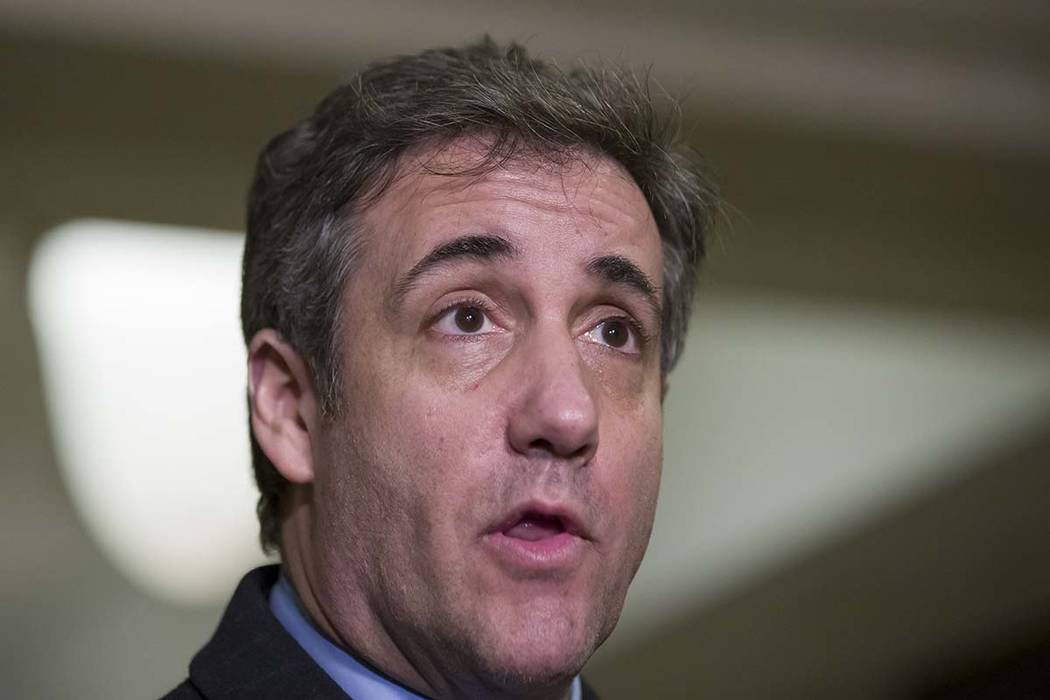Trump shuts off pardon pipeline after early flurry
WASHINGTON — President Donald Trump and Michael Cohen, his former personal attorney, have been feuding over whether Cohen or his attorneys sought a presidential pardon and whether Trump’s lawyers dangled a pardon before Cohen to assure his silence.
On this, few would disagree: Cohen, who pleaded guilty to tax evasion and campaign finance violations and has been cooperating with special counsel Robert Mueller’s investigation into Russian interference in the 2016 election, has little reason to expect a pardon.
But as the two tough guys duke it out on camera and Twitter, few seem to have noticed that Trump has hit the brakes on the use of pardon power.
Why isn’t Trump using the rare power that he can exercise without having to go through Congress or the courts?
Critics say it’s likely because the president and his advisers have become keenly aware that granting a pardon could have unexpected consequences.
“The president has been using the pardon power in a very unconventional way,” Rep. Raja Krishnamoorthi, D-Ill., told CNN, arguing that Trump had been “dangling pardons” before Paul Manafort, his former campaign chairman, whom Mueller successfully prosecuted for tax fraud and bank fraud. If he were to grant one, it could be obstruction of justice, he said.
‘Not considering pardons’
Rudy Giuliani, one of Trump’s personal attorneys, would not confirm whether Cohen’s legal team sought a pardon, but he did tell The Washington Post that “the president is not considering pardons at this time.”
Trump issued his first pardon in August 2017 — just seven months after taking office.
By contrast, former presidents Barack Obama, George W. Bush and Bill Clinton waited until their second year in office to use the unfettered power embedded in the Constitution.
In less than a year, Trump issued seven pardons and four commutations. Then the grants stopped. Trump has not exercised his pardon power since July.
Trump was so proud of one commutation that he invited the recipient, Alice Marie Johnson, an African-American nonviolent drug offender, to his 2019 State of the Union address.
“Alice’s story underscores the disparity and unfairness that can exist in criminal sentencing and the need to remedy this total injustice,” Trump said as he hailed Johnson as “a terrific woman” and talked up the First Step Act, a criminal justice sentencing reform measure he signed in December.
Johnson also served as an example of Trump’s idiosyncratic use of his ability to end and erase federal sentences. She came to Trump’s attention through reality TV star Kim Kardashian West, who visited the White House to champion Johnson’s case.
“He’s smart enough to realize that to pardon a deserving person might also be really good politics,” observed Mark Corallo, spokesman for the Department of Justice under President George W. Bush, “particularly with minority populations where they are disproportionately convicted of crimes.”
Most beneficiaries of Trump’s pardons, however, have been subjects of conservative campaigns against what were seen as miscarriages of justice.
The pardon parade
Trump’s first pardon went to Joe Arpaio, the former Maricopa County, Arizona, sheriff who had been found guilty of defying a court order to stop apprehending undocumented Latino immigrants and handing them over to federal immigration authorities. Arpaio had endorsed Trump during the 2016 GOP primary.
In April, Trump pardoned Scooter Libby, the former aide to Vice President Dick Cheney, who had been convicted of perjury. The next month, Trump pardoned conservative author Dinesh D’Souza, who had pleaded guilty to campaign fraud.
In July, Trump pardoned and commuted the sentences of father-and-son ranchers Steven and Dwight Hammond on arson charges that stemmed from a dispute with federal land management officials.
Despite the pardon shutdown, an administration official, who spoke on condition of anonymity, said there has been no change of thinking on use of the executive branch power. It’s “business as usual,” the official told the Review-Journal.
Meanwhile, critics of the criminal justice system, on both the right and the left, have found a lot to like about Trump’s approach to the pardon.
“I’m pretty impressed that the president has been arguing for a more streamlined system,” Arthur Rizer, of the smaller-government R Street think tank, told the Review-Journal.
Jessica Jackson, of the #cut50 group, which describes itself as a bipartisan effort to reform the criminal justice system, agreed. Asked about the pardon hiatus, she ventured, “July through December was crunch time of the First Step Act,” the bipartisan prison and sentencing reform measure Trump signed. The bill, not pardons and commutations, were the focus of reformers’ energy.
In December, Trump flirted on Twitter with a Christmas pardon for former Illinois Gov. Rod Blagojevich, a Democrat sentenced to 14 years in prison on corruption charges because of what his wife, Patti, described as a corrupt Department of Justice.
Then nothing happened.
That may be by design, said Carallo, the former DOJ spokesman.
“If he starts pardoning people left and right,” said Corallo, “he’ll be accused of ramping up to obstruction of justice.”
Contact Debra J. Saunders at dsaunders@reviewjournal.com or 202-662-7391. Follow @DebraJSaunders on Twitter.
What is a pardon?
"Typically, a pardon officially forgives an offender for a crime. It usually erases the criminal record and restores civil rights, including voting rights."
What is a commutation?
"A commutation of sentence is granted to an individual serving time in federal or state prison. It shortens their sentence to allow for early or immediate release."
-Criminal Justice Policy Foundation





















